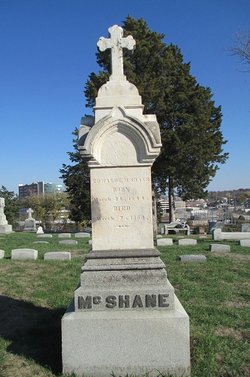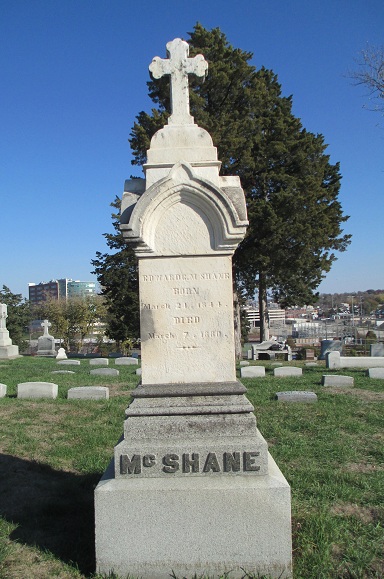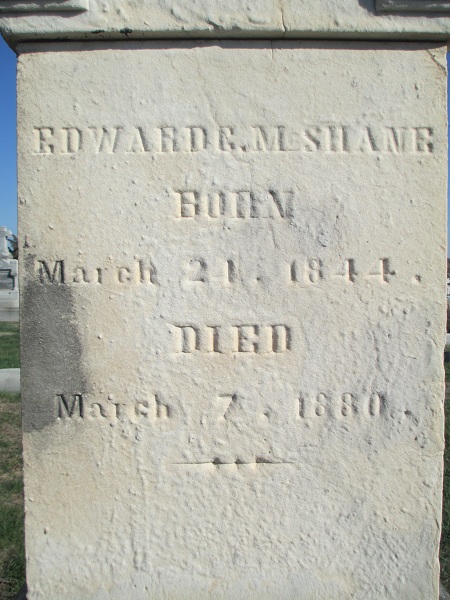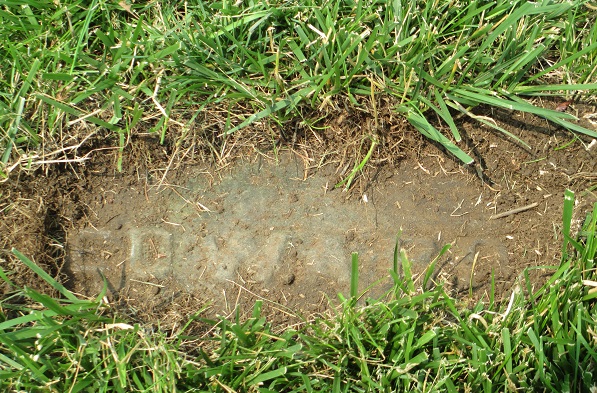EDWARD C. McSHANE.
The Life of a Representative Young Business Man.
Which Has Come to an Untimely Close – Expressions of Respect.
Mr. Edward C. McShane, for some years back one of the most prominent of the citizens of Omaha, after an illness of five weeks, of congestion of the lungs, died, at his residence on the southeast corner of Howard and Ninth streets, at 10 o'clock on last Sunday morning.
Mr. McShane was born near Springfield, Clark county, Ohio, on the 24th of March, 1844. When two years of age, he moved with his parents to Perry county, Ohio, where he spent his boyhood. He received a common-school education, but desiring to increase his knowledge, he managed, both by industry and economy, to save enough from the earnings of his rural labor, to enter the commercial course in the university of Notre Dame, near South Bend, Ind.,in September of 1866. He left the college at the close of the scholastic year in June, 1867, with the reputation of being one of the most expert accountants whom the university had thus far sent forth.
At that time the west was an attractive field for ambitious young men, and Mr. McShane directed his course hither, arriving in Omaha in August, 1867. In November of the same year he went to Wyoming, where he became a secretary to his uncle, the late Edward Creighton, who, at that time, was one of the moving spirits of that active period. While thus employed he discovered evidence of coal at Carbon, in Wyoming, which, upon being followed, resulted in the development of rich deposits of that mineral, and the opening of a mine, which he successfully operated. After a stay at Carbon of about one year and a half, he returned to Omaha, where he has since resided.
His successful management of the intricate business of Mr. Edward Creighton, requiring as it did, not only clerical accuracy, but financial ability, suggested him as a capable party for the important position of County Treasurer. He was nominated and elected in 1871, and served his term of two years, with satisfaction to the people and credit to himself. He was elected to the city council from the First ward in 1875, and in the second year of his term, was raised to the dignity of president of that body.
Since the death of Mr. Edward Creighton, Mr. McShane has been associated with Mr. John A. Creighton, in the capacity of secretary, in the management of the immense estate of which the last mentioned gentleman is executor.
In 1869 Mr. McShane became a member of the volunteer fire department, acting for five years with No. 3, over which he presided for two years, and of which, at the time of his death, he was an honorary member. During his early manhood, he was a member of the Omaha Sportsman's club, as also a director of the public library. At the time of his death, he was a director of the Omaha Nail Works, also of the Omaha and Northern Nebraska railroad, vice president of the Omaha Board of Trade, and a member of the firm of Creighton & Co., one of the leading firms of cattle shippers to the west.
Mr. McShane was married to Miss Agnes Maginn, of Burlington, Iowa, on the 28th of December, 1871, who survives him, as do also their three children, interesting little girls, aged respectively seven, five and three years.
Mr. McShane was one of a family of nine, of whom six, also the father and mother, survive him. He was a nephew of Edward and John A. Creighton, his mother being a sister of those gentleman. Though cut down in early manhood, Mr. McShane leaves evidence of an unusually successful life. He is generally conceded to have been worth about $60,000, which, of course, will abundantly provide for the loved ones who lament his loss.
Mr. McShane was a genial, kindly gentleman, a loving husband and father, and an active, enterprising and public-spirited citizen. He was reflective and far-seeing, prudent and resolute, earnest and tenacious. His opinions were solicited and respected, his promises were never doubted.
His funeral will take place from his late residence at 10 o'clock to-day, to St. Philomena's Cathedral.
`````````````````````````````
March 10, 1880, p. 8, col. 4
TO HIS LONG HOME.
The Remains of Edward C. McShane Laid Away.
In the Presence of a Throng of Mourners and with Eloquent Tributes.
The funeral of the late Edward Creighton McShane took place yesterday morning at ten o'clock from St. Philomena's Cathedral. The remains laid until the hour of the service in the east parlor of his late residence, enclosed in a costly and magnificent casket. The room presented an appearance that filled the spectator with awe and reverence. The glad rays of the sun were shut out and the gloom of the death chamber was relieved only by the subdued light of the candles which burned around the bier. Close friends knelt on every side, wrapt in fervent prayer.
The hour of ten having arrived, the cathedral bell tolled, a procession formed and the remains were taken to the church, preceded by a delegation of firemen under command of Chief Galligan. As the body was borne down the aisle into the sanctuary, the organ pealed forth the notes of a solemn march. The altar was draped with black, and the perfume of fragrant flowers, tributes of loving friends, blended with the incense of the censer. Three emblems – a wreath, a Maltese and a Latin cross – reposed upon the casket. A floral design in the form of a tablet of white flowers with the initials "E.C.M." in Immortelles stood on one side of the casket, while a lyre consisting of roses, immortelles and other appropriate flowers appeared on the opposite side.
A solemn high mass of requiem was celebrated, Rev. Father Shaffel, S. J., being celebrant, Rev. Father McCarthy Deacon, Rev. Father English Sub-Deacon, and Father O'Connor Master of Ceremonies.
The choir rendered Schmidt's requiem mass in A flat, with great expression. The choir consisted of Misses Burkley and Kennedy, sopranos; Mrs. C. A. Leary, alto; Messrs. Harmon, Baumer, Wirth, and Dr. J. D. Oakes, basses; Messrs. Henry Dillman and Hoffman, tenors.
Rev. Father Shaffel pronounced an eulogy which was an eloquent and tender tribute to one who knows only to be loved. He alluded to the praise of the dead which the presence of this large multitude, their grief-stricken countenances and their tears and sobs spoke more eloquently than words could do. He impressed the lesson that the church would teach on such an occasion as this, and exhorted all of his hearers to be prepared for death. The dear relative and lamented friend whom you mourn was stricken down in the middle of his days; he had a bright future before him; he was destined to accomplish much. He leaves behind a young and sorrow-stricken spouse, who esteems life a burden without him, for whom there can be no home that does not enclose that lovely form. He leaves behind three little daughters, pictures of innocence, too young yet to realize the great loss which they sustain to day. Why did death not strike at the door of one that could better be spared, who would be less regretted?
The preacher spoke of the benefit of prayers for the dead, and concluded:
Cease not to offer up your fervent supplication to heaven in his behalf, not only at this hour, but during the entire month and frequently during the year. Pray to God, and pray to him with a full confidence that your prayer shall be heard. Our Lord has said that he shall measure unto men with the same measures they have measured unto others. Now, I maintain that the measure your friend has used, has been a measure of charity and goodness, a measure of kindness and mercy. Any one acquainted with his life will testify that he has shown himself most liberal, most generous whenever there was a question of supplying the wants of the poor and needy. Whenever the indigent or the church called for support, he was always ready to assist. Never was he heard to complain that the applications for relief or for the support in church or school were too many. He was always the first to give the good example, If charity covers a multitude of sins, may we not hope that his great charity towards the church and poor – to all those who applied to him – will hasten that sentence of mercy: "Come, ye blessed of my Father, possess the Kingdom prepared for you from the beginning of the world; for I was naked and you clothed me; I was hungry and you gave me to eat; I was thirsty and you gave me to drink."
At the close of the sermon the casket was removed from the church, amid the sweetly mournful strains of "Rest Spirit, Rest," which was sung with touching expression by Mrs. D. J. O'Neill, of Council Bluffs. The pall-bearers were Messrs. James E. Boyd, Wm. F. Heins, H. W. Yates, Ben Gallagher, M. Donovan, J. B. Detwiler, M. W. Claire, Thos. Tallon, P. P. Shelby and John Lee.
The funeral cortege, which was one of great length, proceeded to the cemetery of the Holy Sepulchre, where the last prayer was said and all that was mortal was laid to rest within the cold and silent precincts of the tomb.
Among the organizations represented were the city government, board of trade, fire department, and police department.
EDWARD C. McSHANE.
The Life of a Representative Young Business Man.
Which Has Come to an Untimely Close – Expressions of Respect.
Mr. Edward C. McShane, for some years back one of the most prominent of the citizens of Omaha, after an illness of five weeks, of congestion of the lungs, died, at his residence on the southeast corner of Howard and Ninth streets, at 10 o'clock on last Sunday morning.
Mr. McShane was born near Springfield, Clark county, Ohio, on the 24th of March, 1844. When two years of age, he moved with his parents to Perry county, Ohio, where he spent his boyhood. He received a common-school education, but desiring to increase his knowledge, he managed, both by industry and economy, to save enough from the earnings of his rural labor, to enter the commercial course in the university of Notre Dame, near South Bend, Ind.,in September of 1866. He left the college at the close of the scholastic year in June, 1867, with the reputation of being one of the most expert accountants whom the university had thus far sent forth.
At that time the west was an attractive field for ambitious young men, and Mr. McShane directed his course hither, arriving in Omaha in August, 1867. In November of the same year he went to Wyoming, where he became a secretary to his uncle, the late Edward Creighton, who, at that time, was one of the moving spirits of that active period. While thus employed he discovered evidence of coal at Carbon, in Wyoming, which, upon being followed, resulted in the development of rich deposits of that mineral, and the opening of a mine, which he successfully operated. After a stay at Carbon of about one year and a half, he returned to Omaha, where he has since resided.
His successful management of the intricate business of Mr. Edward Creighton, requiring as it did, not only clerical accuracy, but financial ability, suggested him as a capable party for the important position of County Treasurer. He was nominated and elected in 1871, and served his term of two years, with satisfaction to the people and credit to himself. He was elected to the city council from the First ward in 1875, and in the second year of his term, was raised to the dignity of president of that body.
Since the death of Mr. Edward Creighton, Mr. McShane has been associated with Mr. John A. Creighton, in the capacity of secretary, in the management of the immense estate of which the last mentioned gentleman is executor.
In 1869 Mr. McShane became a member of the volunteer fire department, acting for five years with No. 3, over which he presided for two years, and of which, at the time of his death, he was an honorary member. During his early manhood, he was a member of the Omaha Sportsman's club, as also a director of the public library. At the time of his death, he was a director of the Omaha Nail Works, also of the Omaha and Northern Nebraska railroad, vice president of the Omaha Board of Trade, and a member of the firm of Creighton & Co., one of the leading firms of cattle shippers to the west.
Mr. McShane was married to Miss Agnes Maginn, of Burlington, Iowa, on the 28th of December, 1871, who survives him, as do also their three children, interesting little girls, aged respectively seven, five and three years.
Mr. McShane was one of a family of nine, of whom six, also the father and mother, survive him. He was a nephew of Edward and John A. Creighton, his mother being a sister of those gentleman. Though cut down in early manhood, Mr. McShane leaves evidence of an unusually successful life. He is generally conceded to have been worth about $60,000, which, of course, will abundantly provide for the loved ones who lament his loss.
Mr. McShane was a genial, kindly gentleman, a loving husband and father, and an active, enterprising and public-spirited citizen. He was reflective and far-seeing, prudent and resolute, earnest and tenacious. His opinions were solicited and respected, his promises were never doubted.
His funeral will take place from his late residence at 10 o'clock to-day, to St. Philomena's Cathedral.
`````````````````````````````
March 10, 1880, p. 8, col. 4
TO HIS LONG HOME.
The Remains of Edward C. McShane Laid Away.
In the Presence of a Throng of Mourners and with Eloquent Tributes.
The funeral of the late Edward Creighton McShane took place yesterday morning at ten o'clock from St. Philomena's Cathedral. The remains laid until the hour of the service in the east parlor of his late residence, enclosed in a costly and magnificent casket. The room presented an appearance that filled the spectator with awe and reverence. The glad rays of the sun were shut out and the gloom of the death chamber was relieved only by the subdued light of the candles which burned around the bier. Close friends knelt on every side, wrapt in fervent prayer.
The hour of ten having arrived, the cathedral bell tolled, a procession formed and the remains were taken to the church, preceded by a delegation of firemen under command of Chief Galligan. As the body was borne down the aisle into the sanctuary, the organ pealed forth the notes of a solemn march. The altar was draped with black, and the perfume of fragrant flowers, tributes of loving friends, blended with the incense of the censer. Three emblems – a wreath, a Maltese and a Latin cross – reposed upon the casket. A floral design in the form of a tablet of white flowers with the initials "E.C.M." in Immortelles stood on one side of the casket, while a lyre consisting of roses, immortelles and other appropriate flowers appeared on the opposite side.
A solemn high mass of requiem was celebrated, Rev. Father Shaffel, S. J., being celebrant, Rev. Father McCarthy Deacon, Rev. Father English Sub-Deacon, and Father O'Connor Master of Ceremonies.
The choir rendered Schmidt's requiem mass in A flat, with great expression. The choir consisted of Misses Burkley and Kennedy, sopranos; Mrs. C. A. Leary, alto; Messrs. Harmon, Baumer, Wirth, and Dr. J. D. Oakes, basses; Messrs. Henry Dillman and Hoffman, tenors.
Rev. Father Shaffel pronounced an eulogy which was an eloquent and tender tribute to one who knows only to be loved. He alluded to the praise of the dead which the presence of this large multitude, their grief-stricken countenances and their tears and sobs spoke more eloquently than words could do. He impressed the lesson that the church would teach on such an occasion as this, and exhorted all of his hearers to be prepared for death. The dear relative and lamented friend whom you mourn was stricken down in the middle of his days; he had a bright future before him; he was destined to accomplish much. He leaves behind a young and sorrow-stricken spouse, who esteems life a burden without him, for whom there can be no home that does not enclose that lovely form. He leaves behind three little daughters, pictures of innocence, too young yet to realize the great loss which they sustain to day. Why did death not strike at the door of one that could better be spared, who would be less regretted?
The preacher spoke of the benefit of prayers for the dead, and concluded:
Cease not to offer up your fervent supplication to heaven in his behalf, not only at this hour, but during the entire month and frequently during the year. Pray to God, and pray to him with a full confidence that your prayer shall be heard. Our Lord has said that he shall measure unto men with the same measures they have measured unto others. Now, I maintain that the measure your friend has used, has been a measure of charity and goodness, a measure of kindness and mercy. Any one acquainted with his life will testify that he has shown himself most liberal, most generous whenever there was a question of supplying the wants of the poor and needy. Whenever the indigent or the church called for support, he was always ready to assist. Never was he heard to complain that the applications for relief or for the support in church or school were too many. He was always the first to give the good example, If charity covers a multitude of sins, may we not hope that his great charity towards the church and poor – to all those who applied to him – will hasten that sentence of mercy: "Come, ye blessed of my Father, possess the Kingdom prepared for you from the beginning of the world; for I was naked and you clothed me; I was hungry and you gave me to eat; I was thirsty and you gave me to drink."
At the close of the sermon the casket was removed from the church, amid the sweetly mournful strains of "Rest Spirit, Rest," which was sung with touching expression by Mrs. D. J. O'Neill, of Council Bluffs. The pall-bearers were Messrs. James E. Boyd, Wm. F. Heins, H. W. Yates, Ben Gallagher, M. Donovan, J. B. Detwiler, M. W. Claire, Thos. Tallon, P. P. Shelby and John Lee.
The funeral cortege, which was one of great length, proceeded to the cemetery of the Holy Sepulchre, where the last prayer was said and all that was mortal was laid to rest within the cold and silent precincts of the tomb.
Among the organizations represented were the city government, board of trade, fire department, and police department.
Gravesite Details
Shares stone with daughter Lucretia Sargent.
Family Members
Advertisement
Explore more
Sponsored by Ancestry
Advertisement



















